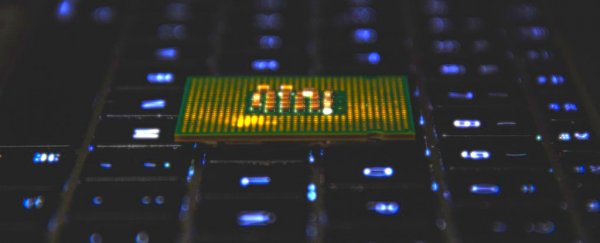Quantum computers exist today, although they're limited, cut-down versions of what we hope fully blown quantum computers are going to be able to do in the future.
But now, researchers have developed hardware for a 'probabilistic computer' – a device that might be able to bridge the gap between genuine quantum computers and the standard PCs and Macs we have today.
The special trick that a probabilistic computer can do is to solve quantum problems without actually going quantum, as it were. It does this using a p-bit, which the team behind this research describes as a "poor man's qubit".
Whereas classical computing bits can store either a 1 or a 0, qubits can be both at the same time, thanks to the laws of quantum computing – and that means a big leap in processing power. A p-bit, meanwhile, can only be a 1 or a 0, but they can switch between those two states very, very quickly.
By carefully controlling these fluctuations, scientists can tackle calculations of a kind that are generally considered to be quantum computing problems, but without an actual quantum computer.
As an added bonus, p-bits work at room temperature, whereas qubits need super-cold conditions to operate properly, so they're easier to adapt into existing computers.
"There is a useful subset of problems solvable with qubits that can also be solved with p-bits," says electrical and computer engineer Supriyo Datta,from Purdue University in Indiana. "You might say that a p-bit is a 'poor man's qubit'."
The result of the research was a modified magnetoresistive random-access memory (MRAM) device, used to store information in some of today's computers. Magnetic orientations are used to create states of resistance that represent 1s or 0s.
Eight of these custom-made MRAM p-bit units were put together with a controller chip to form a probabilistic computer – one where units are only likely to adopt a specific value (which is where the "probabilistic" name comes from).
The researchers were then able to solve integer factorisation problems, where numbers are broken down into smaller multiples. This is usually considered a quantum problem, one that quantum computers would excel at – classical computers can do it, just more slowly and less efficiently.
This probabilistic computer and its p-bits represents some sort of middle ground between the two. The researchers suggest that fully realised p-bit machines would handle integer factorisation and similar problems using less space and energy than today's computers.
"On a chip, this circuit would take up the same area as a transistor, but perform a function that would have taken thousands of transistors to perform," says computer and electrical engineer Ahmed Zeeshan Pervaiz from Purdue University.
"It also operates in a manner that could speed up calculation through the parallel operation of a large number of p-bits."
This machine is going to have to be scaled up and refined further to be of practical use, but the researchers think those advancements might not be too far off. These devices can then take over from classical computers for certain problems, until the quantum computing revolution finally arrives.
Scientists are making progress, but there's still some way to go before qubits are stable and practical enough to actually run the sums we need them to run and to scale up properly. Making qubits and connecting them together remains a tough challenge.
"In the near future, p-bits could better help a machine to learn like a human does or optimise a route for goods to travel to market," says one of the researchers, Kerem Camsari.
The research has been published in Nature.
